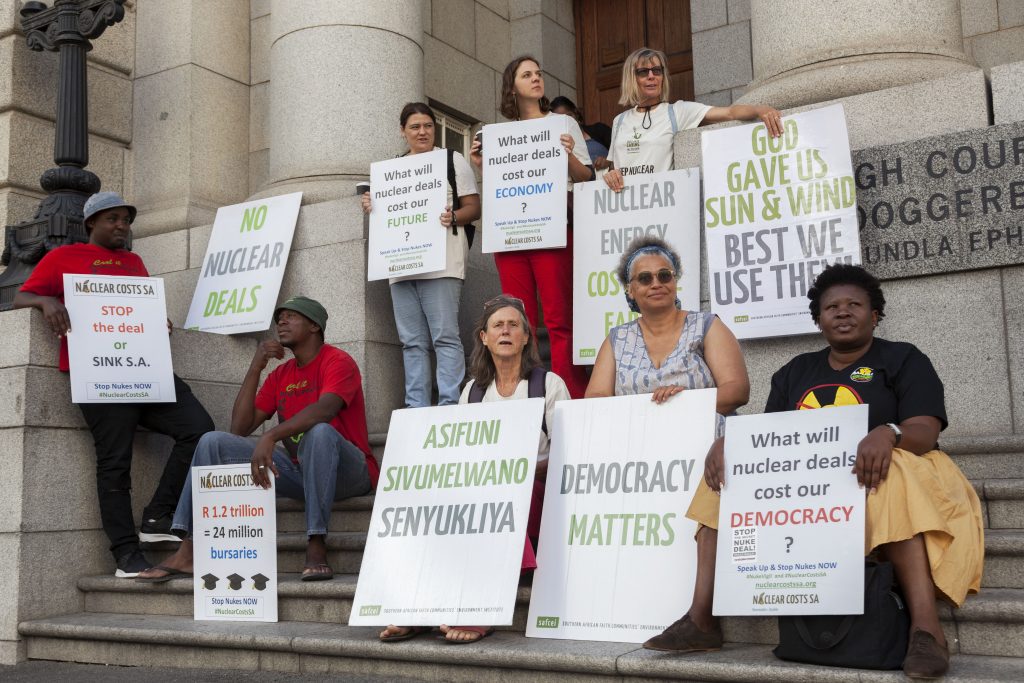Human Rights Day 2017 – reflection on our humanity
- Published:
22 March 2016
Media release
Human Rights Day 2017 – reflection on our humanity
We link Human Rights Day in South Africa with 21 March 1960 and Sharpeville. On that day 69 people died and 180 were wounded when police fired on a peaceful crowd that had gathered in protest against the Pass laws. That day was an affirmation by ordinary people, rising in unison to proclaim their rights – as human beings amongst human beings.
On 11 March 2011, the Fukushima nuclear accident took place in Japan. As we appreciate human rights day, last Friday, the Japanese courts found that the Japanese government and Tokyo Electric Power had been are liable for negligence in a case involving compensation for the Fukushima nuclear disaster[1]. In December, the Japanese government doubled its projections related to the disaster to $188 billion[2].
How does it feel finding out after the fact that your government is to blame when your land and sea are contaminated, and your livelihoods threatened – their rights trampled on? The people of South Africa should learn from the people of Japan about what not to do.
Human Rights Day honours our common humanity. Yet all around us we see, as Jay Naidoo observes, a political system that seems to have lost its mind, and lost its link with humanity, with its own common humanity.
“We see a system pushing for power at all costs, an elite class who squander our common humanity in pursuit of their own short-term objectives. We see an arrogant political system that will not listen to the people, nor even to the highest courts of the land”, says executive Director, Buddhist Ani Tsondru.
 Concerned citizens gather outside the Cape High Court for the SAFCEI & ELA Jhb's first court hearing.
Concerned citizens gather outside the Cape High Court for the SAFCEI & ELA Jhb's first court hearing.
The Constitution of this country is held up as a shining example throughout the world. Yet citizens, ordinary people of this beloved land, are more and more being forced to the last resort, turning to the Judiciary for protection. Even the Judiciary is treated with contempt and disdain. Government Ministers, civil servants, officials, so many have capitulated to a creeping arrogance, a contempt for the people, for our land, and a contempt for the Constitution. Tax-payer money, sorely needed for a myriad social projects, is squandered on legal wrangling by these same Ministers and officials as they try to evade their responsibility to the people, and liability for their actions. There is a stunning absence of shame and humility.
These attitudes are profoundly affecting the lives of people, the health and integrity of our communities, and the natural surroundings which are our source of life.
Nuclear energy is being pushed by Ministers and officials, seemingly intent on ignoring due process as prescribed in law, potentially squandering R1 trillion on a nuclear deal. The people of South Africa have not been informed about the risks of nuclear power, have not been consulted and are reliant on the courts to uphold our rights.
South Africa is blessed with some of the best solar and wind energy in the world, which is being harnessed to produce electricity in a way that can protect our environmental and socio-economic rights enshrined in the constitution, while providing affordable electricity.
After the Fukushima nuclear disaster in Japan, the Catholic Bishops of Japan in assessing the pro’s and cons of nuclear energy stated: "[Nuclear energy] has provided a totally new source of energy for humanity, but as we can see in the destruction of human life in a moment in Hiroshima and Nagasaki, the disaster at Chernobyl and the life-threatening criticality accident at Tokaimura, it also has the potential to pass huge problems on to future generations. To use it effectively, we need the wisdom to know our limits and exercise the greatest care. In order to avoid tragedy, we must develop safe alternative means of producing energy.” [3] This nuclear disaster wiped out the “safety myth”, which was created because people put too much trust in science and technology without having “the wisdom to know our limits”. The Catholic Bishops of Japan then called for the abolishment of all nuclear plants in Japan.
A healthy environment is imperative for life. But at almost every turn the environment is the price paid by each one of us, while yet another money-hungry developer of one kind or another is handed our natural heritage on a plate, to make a profit from, under a guise of ‘growth’, ‘development’, and ‘jobs’.
We should claim our rights to a sustainable environment that provides for our well-being.
For more on the nuclear challenge facing the country, see http://nuclearcostssa.org/
[1] http://www.atimes.com/article/japan-court-shocks-nuclear-industry-liability-ruling/
[2] http://europe.newsweek.com/japan-court-rules-government-blame-fukushima-569533?rm=eu
[3] “Reverence for Life –A Message for the Twenty-First Century from the Catholic Bishops of Japan”
Who we are

SAFCEI (Southern African Faith Communities’ Environment Institute) is a multi-faith organisation committed to supporting faith leaders and their communities in Southern Africa to increase awareness, understanding and action on eco-justice, sustainable living and climate change.
Featured Articles
-

South Africa: Who Ends Up Paying If DMRE Cooks the Price of Nuclear Power?
-

South Africa’s nuclear energy expansion plans continue to draw criticism, environmental NGOs chew over legal challenge
-

Earthlife Africa and SAFCEI respond to latest unsettling nuclear news regarding the ministerial determination
-

Open Wing Alliance Africa (Virtual) Summit 2023
-

The Green Connection and SAFCEI respond to energy minister's divisive and deflecting comments
-

Job Vacancy: FLEAT Coordinator







